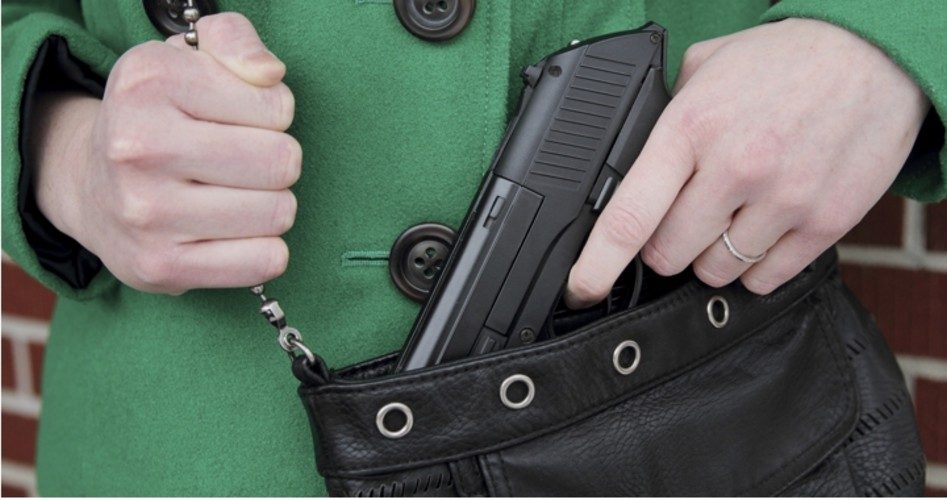
Texas Governor Greg Abbott now has his chance. On Sunday, May 31, the campus carry bill proposed in February by state Representative Brian Birdwell passed the Senate and is now on Abbott’s desk, waiting for his signature. He promised that he would “sign any bill that expands gun rights on campus.”
Once the bill is signed, students with concealed carry permits would be able to lawfully carry on the campuses of “all institutions of higher learning” in the Lone Star State, starting September 1, while the effective date for community colleges is August 1, 2017.
This law rectifies a gap and clarifies and strengthens Second Amendment rights for students who have been discriminated against in Texas for years. As explained by State Representative Allen Fletcher:
Students 21 years of age and older have been lawfully and responsibly carrying in Texas for over nineteen years; they’ve been able to carry their concealed handguns in public and on campus grounds but the moment they step foot into an academic building they became criminals.
Compromises at the last minute softened the bill somewhat, giving some discretion to university authorities about just when and where those with permits may carry. Fletcher said there were “legitimate places” on campus where universities would not want guns allowed, such as the National Biocontainment Laboratory in Galveston and some other limited areas. But in general, the new law is acceptable to Texas A&M Chancellor John Sharp:
I cannot speak to the effect campus carry would have on other institutions and their students. However, I have complete trust and faith in our students. Having licensed gun owners in possession of legal weapons on our campuses does not raise safety concerns for me personally.
The real question is this: “Do I trust my students, faculty and staff to work and live responsibly under the same laws at the university as they do at home?”
Of course I do!
Not every chancellor is so agreeable. During hearings, University of Texas Chancellor Bill McRaven urged his faculty members to attend them and to express their opinions. The following was sent out via e-mail from UT math professor Bill Beckner, with a clear warning about how to testify if they wanted to be considered for tenure:
The views of faculty members are important and the Senate will benefit from hearing those views.
As I expect you are aware, both President Bowers and Chancellor McRaven have expressed their opinion that this measure will not enhance safety for students, faculty and staff on our campus.
The threat was clear to another UT professor, who spoke anonymously to Breitbart Texas: “When you’re considering who you’re going to make a permanent part of the faculty, you take that kind of thing into consideration.”
In his own testimony, delivered by letter to the state Senate during those hearings, UT Chancellor McRaven came up with yet another reason why the campus carry bill shouldn’t advance: It would make UT less competitive to the sort of left-wing professors they would like to hire:
The presence of handguns on Texas campuses, where we would be one of fewer than 10 states to allow this conduct, may well cause faculty to be discouraged from relocating from other states. The intuitive answer is that the presence of concealed weapons will make us less competitive.
Chancellor McRaven needn’t worry. Students in Colorado, Idaho, Mississippi, Oregon, Utah, Wisconsin, and (soon) Kansas have been successfully attending classes and living on public post-seconday campuses where concealed cary is allowed for years without incident. Had there been any such incidents, the mainstream media would long ago have made certain that every sentient soul on planet Earth knew about them.
In Colorado, for example, where campus carry has been the law of the land since 2003, there has been but a single incident: the accidental discharge of a firearm by a university employee who was immediately fired. In more than a decade not a single incident has involved a student.
Even the left-of-center Washington Post reported that concealed carry on campuses can have a positive effect:
The U.S. Census Bureau conducts in-person interviews with several thousand persons annually, for the National Crime Victimization Survey (NCVS). In 1992-2002, over 2,000 of the persons interviewed disclosed they had been raped or sexually assaulted.
Of them, only 26 volunteered that they used a weapon to resist. In none of those 26 cases was the rape completed; in none of the cases did the victim suffer additional injury after she deployed her weapon.
As the momentum favoring Second Amendment rights continues to build, so do the arguments against them become thinner and thinner.
A graduate of an Ivy League school and a former investment advisor, Bob is a regular contributor to The New American magazine and blogs frequently at www.LightFromTheRight.com, primarily on economics and politics.



